Companies are making substantial investments in technology-driven automation and optimization. As of 2024, there are over 14,000 MarTech solutions, and the global spending on marketing technology is expected to grow at an annual rate of 13.3%, surpassing $215 billion by 2027.
Marketing is changing fast, and staying competitive in the business world entails leveraging the latest marketing technology (MarTech). Investing in the right marketing tools empowers marketers to streamline their marketing efforts, personalize interactions, and drive results. But while digital marketing tools are abundant, companies have to make wise decisions when choosing which ones to invest in.
Tools for Marketing Analytics
1. Google Analytics
Google Analytics remains one of the leading web analytics tools in the digital marketing landscape. It is a free web analytics service that provides essential tools and statistics for search engine optimization (SEO) and marketing. Google Analytics allows marketers to monitor and analyze website performance and visitor information.
Google Analytics Dashboard
Image by Semrush
Google Analytics provides in-depth insights into website traffic and user behavior. Its advanced features and functionalities allow businesses to better understand the customer experience and improve marketing return on investment (ROI).
Some key features of Google Analytics include:
- Evaluating audience behaviors and ensuring targeted relevance
- Tracking and analyzing website Key Performance Indicators (KPI)
- Guiding business SEO content strategy
- Assessing and enhancing strategies to achieve marketing objectives
2. HubSpot Marketing Hub
HubSpot Marketing Hub is an all-in-one marketing automation tool that offers a broad range of tools for inbound marketing, lead generation, and customer relationship management (CRM). HubSpot is designed to help businesses attract, engage, and delight customers through a combination of content creation, email marketing, social media management, and analytics.
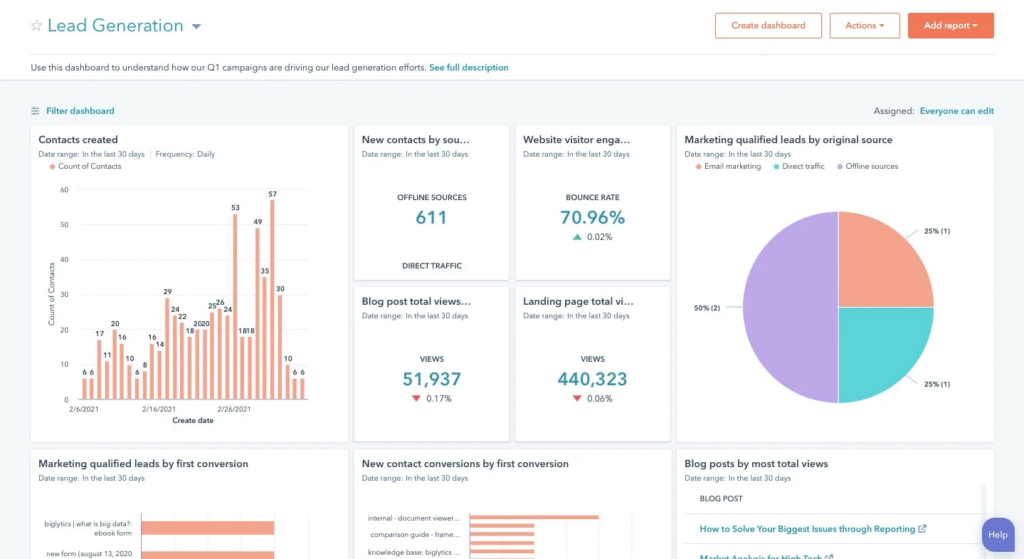
Image by HubSpot
One of the key features of HubSpot Marketing Hub is its ability to create and manage marketing campaigns from a single dashboard. Marketers can build landing pages, design email campaigns, and schedule social media posts, all while tracking the performance of these activities in real-time. HubSpot’s CRM integration allows for seamless lead tracking and nurturing, ensuring that marketing efforts are aligned with sales goals.
In the 2023 Gartner Magic Quadrant for B2B Marketing Automation Platforms, HubSpot has once again been recognized as a Leader in B2B Marketing Automation Platforms for the third consecutive year due to its robust features, ease of use, and strong customer satisfaction. HubSpot’s continuous innovation for marketing automation and CRM integration has solidified its leadership position in the industry.

Image by Gartner
Tools for Search Engine Marketing (SEM)
1. Moz
Moz is the do-it-all tool in the field of SEO analytics. It offers a range of features designed to help marketers improve their website’s visibility in search engine results pages (SERPs), making it an essential tool for any marketer focused on driving organic traffic.
Moz provides a suite of tools designed to help businesses improve the quality of their SEO performance. Moz SEO features include:
- Keywords Research Tools
- Site Audit
- Link Explorer
- Rank Tracking
- On-page Optimization
- Search Visibility Score
- Competitor Analysis
One of Moz’s standout features is its keyword research tool, which allows marketers to discover and analyze keywords relevant to their business. This tool provides insights into keyword difficulty, search volume, and potential organic traffic. These features help marketers choose the best keywords to target in their content.
Moreover, Moz’s site audit tool can scan websites for technical SEO issues, such as broken links, missing meta tags, and duplicate content. By identifying these issues, marketers can improve their search engine rankings and overall online visibility.
2. Google Search Console
Google Search Console is designed for SEO, helping marketers optimize business websites for better organic search visibility. Unlike paid advertising tools, Google Search Console is entirely free and offers insights into the organic or non-paid side of search engine marketing.
Google Search Console also provides valuable data on keyword performance, showing which search queries are driving traffic to the site, how often the site appears in search results, and what the click-through rates (CTR) are for specific queries. This information is important for refining SEO strategies, as it helps marketers identify which keywords are most effective and where there may be opportunities to improve rankings.
3. SEMrush
Keywords are the heart and foundation of every SEO campaign, and SEMrush is one of the SEO tools that provide brands with keyword insights. Its keyword tool provides users with numerous ways to analyze key phrases: keyword difficulty, intent, volume, trend, and cost per click.
SEMrush also offers a suite of tools for:
- Pay-per-click (PPC) advertising
- Content marketing
- Social media marketing
- Analytics and reports
- Site audit
SEMrush is a powerful digital marketing tool in both organic and paid search campaigns as it utilizes SEO and SEM efforts.
The backlink analysis tools are another popular feature of SEMrush. It can help businesses compare their link profiles with those of their competitors so they can gather insights into their SEO performance and opportunities for improvement. With it, businesses can also test their authority score, which measures their site’s performance based on their overall backlink quality and popularity.
Effective link-building is a critical factor in ranking high in Google’s organic search results. High-quality backlinks from authoritative and relevant sites signal to Google that their content is trustworthy and valuable.
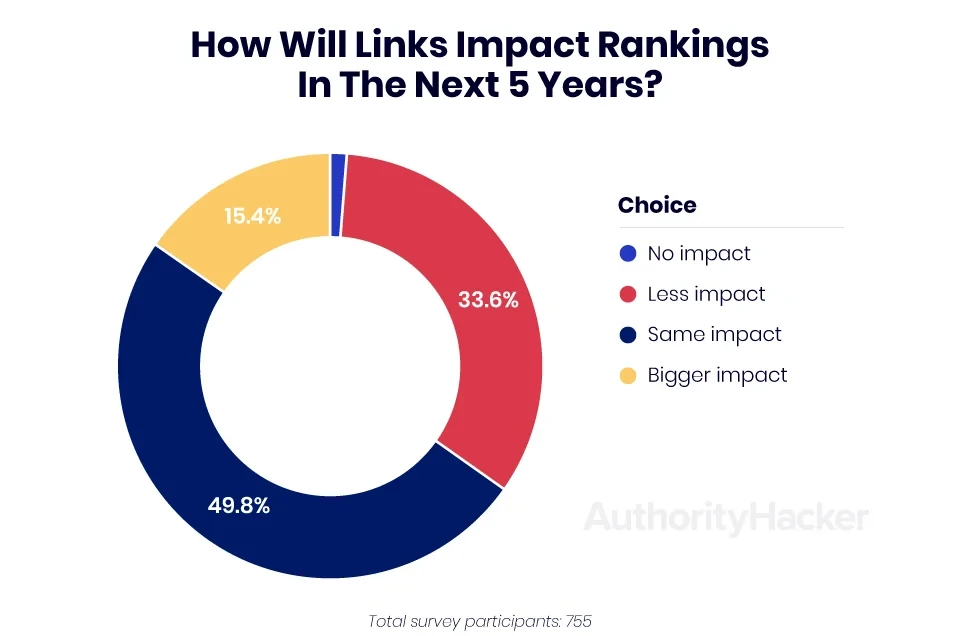
Image by AuthorityHacker
4. Ahrefs
Ahrefs is known for its extensive backlink database, competitive analysis tools, and link-building strategies for acquiring high-quality links. Its keyword research features are also popular in the industry for providing extensive data in terms of search volume, keyword difficulty, and traffic potential. Ahrefs’ other functionalities include site audit, rack tracker, and content explorer, making it a versatile tool for SEO professionals.
While Ahrefs is often associated with SEO, its features are equally valuable for SEM, particularly for businesses looking to improve their organic search rankings and content strategy.

Image by HubSpot
Research shows that 39% of marketing technology prioritizes optimizing on-page content using keywords as their primary SEO strategy. Seeking SEO service in the Philippines can help marketers optimize their on-page content, which can drive site visibility and significant improvements in their digital marketing efforts in 2024.
5. Google Ads
While Google Search Console is focused on organic search results, Google Ads is the go-to tool for businesses looking to engage in paid search advertising. Google Ads allows marketers to quickly reach their target audience through pay-per-click (PPC) advertising, where they bid on keywords relevant to their business. When users search for these keywords, the ads appear at the top or bottom of the SERPs, above the organic results.
The primary advantage of Google Ads is its ability to deliver immediate visibility and traffic. Unlike SEO, which can take time to see results, Google Ads can drive traffic to a website almost instantly after a campaign is launched.
Google Ads offers a variety of advertisement formats, including search, display, video, and shopping ads. It allows businesses to reach specific audiences based on demographics, interests, and behaviors. This precision ensures that marketing efforts are not wasted on uninterested consumers.
Google’s vast reach, encompassing over 92% of internet users worldwide, makes it an irreplaceable tool for boosting consumer loyalty, attracting new clients, and improving customer conversions. With Google Ads integrated into Google Analytics, marketers can get detailed insights into campaign performance, enabling them to make data-driven decisions.
Tools for Social Media
- Hootsuite
Hootsuite provides a centralized platform where users can manage multiple social media accounts from various networks, including Facebook, Twitter, Instagram, and LinkedIn. This integrated dashboard simplifies the process of handling different accounts by consolidating them into a single interface, allowing for efficient posting, monitoring, and engagement.
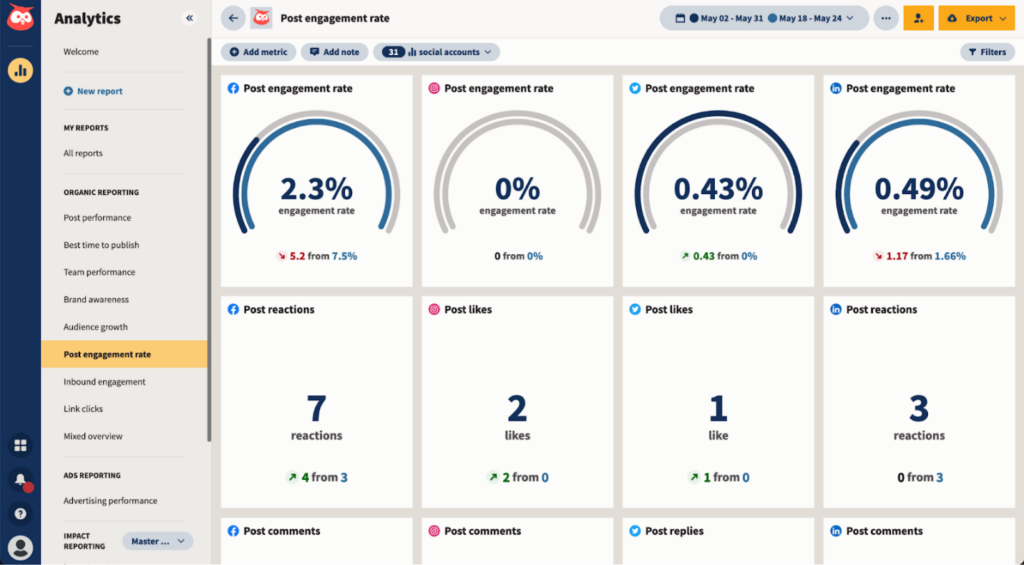
Image by Hootsuite
In 2024, social media continues to thrive as the dominant platform for product discovery. This is even reinforced by a HubSpot study revealing that 41% of consumers find products through social media. With the help of the right social media marketing tools, their brand can harness the power of social media to build their following and amplify their online presence.
- Sprout Social
Sprout Social is another one-stop solution for managing social media platforms. This tool excels in providing information about their social media interactions through advanced CRM features and detailed analytics. It’s well-suited for businesses focused on customer engagement and social commerce.
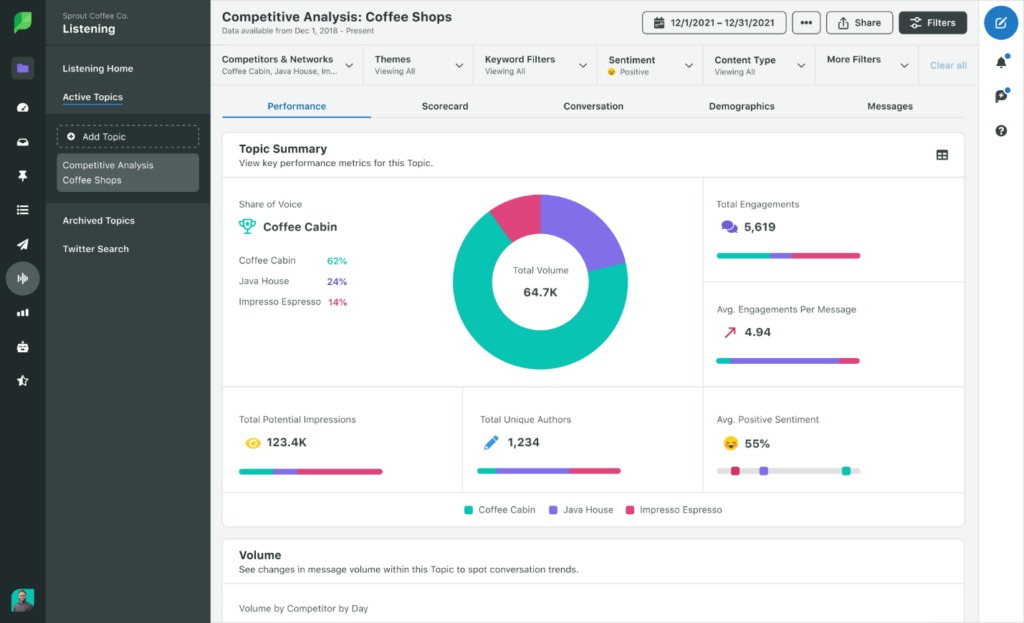
Image by Sprout Social
Key features of Sprout Social include:
- Multi-platform management
- Advanced scheduling and automation
- In-depth analytics and customizable reports
- Social listening and monitoring
- Team collaboration tools
Sprout Social is a helpful tool in social media marketing, especially with its advanced analytics for evaluating campaign performance and understanding audience preferences. Its scheduling tools also help social media managers maintain a consistent social media presence, and its social listening features keep businesses updated on market trends and customer feedback.
Tools for Content Marketing
1. OpenAI
Artificial Intelligence (AI) is one of the biggest marketing trends today. According to a survey, 54% of marketers utilize AI for content creation. That includes producing blog articles, website content, crafting social media posts, product descriptions, and landing pages.
AI tools like OpenAI’s ChatGPT enable businesses to scale their content production efforts, meet the growing demands of their audience, and stay ahead of competitors.
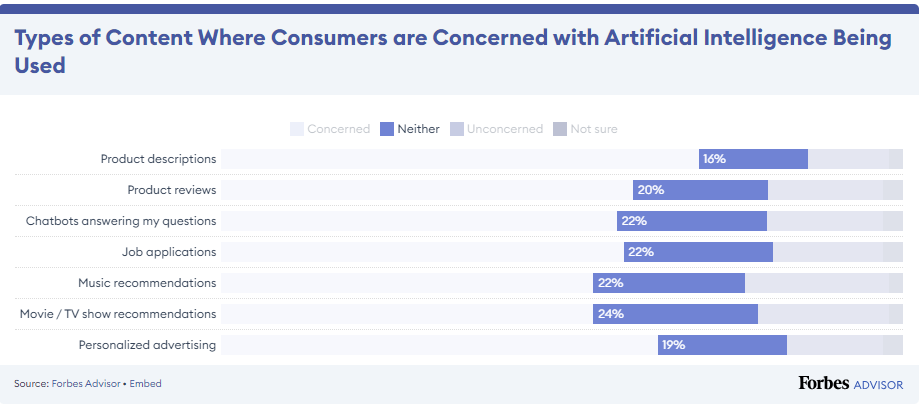
Image by Forbes
2. Canva
Canva’s drag-and-drop interface and extensive library of templates make it easy to create stunning visuals for social media, blog posts, and marketing materials. Its collaboration features enable teams to seamlessly work together on design projects.

Image by Style Factory
Canva is used by people in over 190 countries worldwide, which means it is used in 90% of the world’s nations. Its dominance helps businesses create high-quality graphics, infographics, and visuals quickly that can capture their audience’s attention and drive engagement.
Take Your Brand to the Next Level with Marketing Technology
The advent of marketing and technology has revolutionized the way business interacts with customers, promoting products and driving growth. Integrating marketing technology tools into the business is essential for staying competitive and boosting overall results in 2024.
Enhance your marketing strategies with Digital Marketing Philippines (DMP), a top SEO agency in the Philippines, to optimize your campaign performance. Here at Digital Marketing Philippines, we offer various services for building brand visibility using cutting-edge and latest strategies and digital marketing tools.
Contact us, and let us start making your brand come alive.
Sources:
https://blog.hubspot.com/marketing/what-is-digital-marketing
https://digitalmarketinginstitute.com/blog/what-are-the-most-effective-digital-marketing-strategies
https://blog.hubspot.com/marketing/hubspot-blog-marketing-industry-trends-report
https://blog.hubspot.com/marketing/google-search-statistics
https://mopinion.com/top-tools-martech-stack/
https://blog.hubspot.com/marketing/how-to-build-a-marketing-stack
Jomer B. Gregorio is a well-rounded expert when it comes digital marketing. Jomer is also known as a semantic SEO evangelist and practitioner. Check out our Digital Marketing Services today and let us help you in achieving positive and profitable results for your business.
